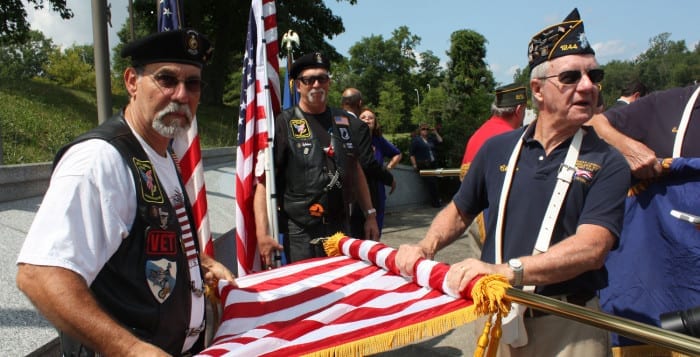Suffolk County, nonprofits make moves to house homeless veterans
Eight affordable rental housing parcels in the works

Suffolk County has gained some footing in the war against veteran homelessness.
Last week, officials announced a proposal to transfer eight tax-defaulted properties over to nonprofit groups that will be charged with developing them into rental housing for homeless veterans or those who are at risk of becoming homeless. The units will be overseen and managed by the non-profit organizations.
The move is part of the Housing our Homeless Heroes legislative initiative, a package of four bills sponsored by Legislator Steve Stern (D-Dix Hills). Officials say there are about 750 Long Island veterans who are either homeless or who are expected to be homeless by the end of 2015.
In a phone interview on Monday, Stern said the county Legislature would vote on the transfer of the properties at its Sept. 9 meeting. He said he expects the resolution, which he is co-sponsoring with County Executive Steve Bellone (D), to gain unanimous support.
Stern, who is the chairman of the county’s Veterans and Seniors Committee, said in addition to housing resources, the veterans will receive additional services through these nonprofits, such as job training and placement; primary and mental health care; disability management and health care coordination; family counseling; financial training and substance abuse services.
“The Housing our Homeless Heroes initiative is the housing part of providing assistance to our veterans and families,” Stern said. “But it can never be just about four walls and a roof.”
Once transferred, the nonprofits would foot the construction bill through roughly $10 million in state and federal grant funding available for such projects, Stern said. Funding for the construction will be provided in part from the New York State Homeless Housing Assistance Program and United States Department of Housing and Urban Development HOME Investment Partnerships Program.
Two parcels in Central Islip will be transferred to the Concern for Independent Living for the construction of three single-family homes. Bay Shore-based United Veterans Beacon House has proposed to rehabilitate an existing home on a Copiague parcel, and build a single-family unit on a Yaphank parcel.
In addition, the Association for Mental Health and Wellness is proposing to build a new four-bedroom house for three senior disabled veterans and a live-in house manager on two parcels in Mastic; rehabilitate a house in Riverhead for one veteran family; and build a new set of four, single room occupancies for veterans on a parcel in Medford.
The Legislature approved the Housing our Homeless Heroes initiative last year, and Bellone signed the legislation into law just days before Christmas. The four laws tackle the issue of veteran homelessness from different angles — one establishes a partnership between agencies and community advocates that serve veterans and their families and helps them set up an informational web portal on the county’s website to direct them to services available across all levels of government and within the nonprofit sector. Another maximizes access to available housing for veterans. The third amended the county’s human rights law by adding veterans as a group of individuals protected against discrimination in housing and employment opportunities. The last bill will require a veteran services officer to work at the county’s Department of Social Services on a regular basis. The officers must be veterans as well, in order to establish a peer-to-peer relationship between those they are helping.
“As an agency committed to ensuring empowering people to overcome the impact of health and mental health disabilities, it is our intent to devote these houses to assist male and female veterans who have been affected by service-connected and post-service transition mental health challenges,” Michael Stoltz, chief executive officer of the Association for Mental Health and Wellness said in a statement. “I thank Suffolk County for partnering with our organization to further assist us in supporting our veterans.”






